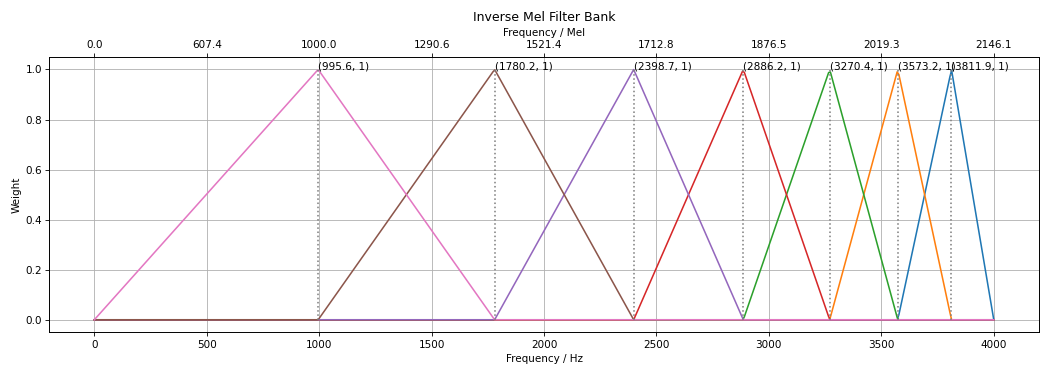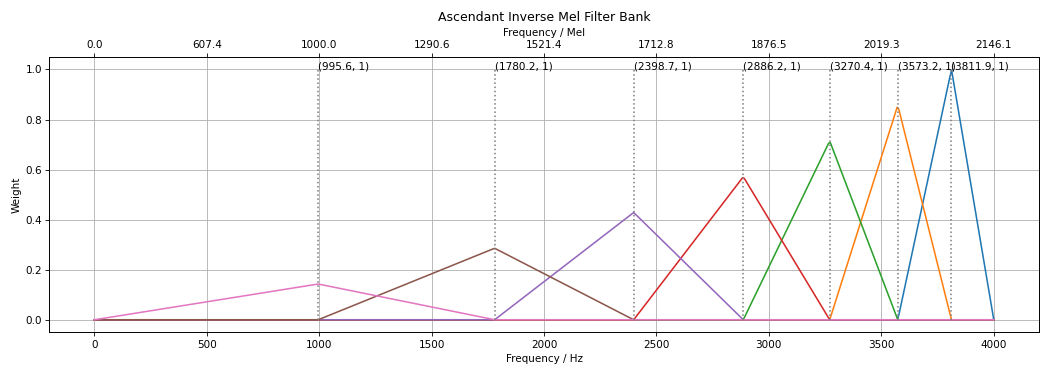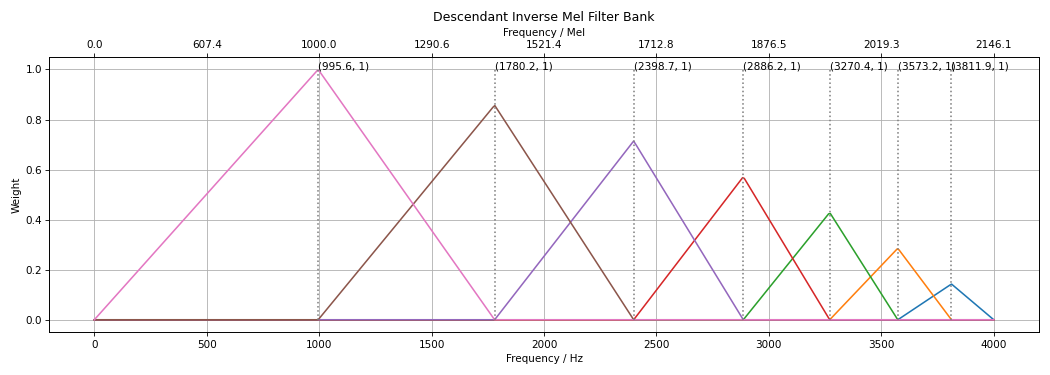spafe.fbanks.mel_fbanks#
Description : Mel filter banks implementation.
Copyright (c) 2019-2024 Ayoub Malek. This source code is licensed under the terms of the BSD 3-Clause License. For a copy, see <https://github.com/SuperKogito/spafe/blob/master/LICENSE>.
- spafe.fbanks.mel_fbanks.mel_filter_banks_helper(nfilts: int = 24, nfft: int = 512, fs: int = 16000, low_freq: float = 0, high_freq: Optional[float] = None, scale: typing_extensions.Literal[ascendant, descendant, constant] = 'constant', fb_type='mel', conversion_approach: typing_extensions.Literal[Oshaghnessy, Lindsay] = 'Oshaghnessy')[source]#
Compute Mel-filter banks.The filters are stored in the rows, the columns correspond to fft bins.
- Parameters
nfilts (int) – the number of filters in the filter bank. (Default 20).
nfft (int) – the FFT size. (Default is 512).
fs (int) – sample rate/ sampling frequency of the signal. (Default 16000 Hz).
low_freq (float) – lowest band edge of mel filters. (Default 0 Hz).
high_freq (float) – highest band edge of mel filters. (Default samplerate/2).
scale (str) – monotonicity behavior of the filter banks. (Default is “constant”).
fb_type (str) – the filter banks type. (Default is “mel”)
conversion_approach (str) – mel scale conversion approach. (Default is “Oshaghnessy”).
- Returns
(numpy.ndarray) : array of size nfilts * (nfft/2 + 1) containing filter bank. Each row holds 1 filter.
(numpy.ndarray) : array of center frequencies
- Return type
(tuple)
Tip
scale: can take the following options [“constant”, “ascendant”, “descendant”].fb_type: can take the following options [“mel”, “lin”].conversion_approach: can take the following options [“Oshaghnessy”, “Beranek”, “Lindsay”]. Note that the use of different options than the default can lead to unexpected behavior/issues.
- spafe.fbanks.mel_fbanks.mel_filter_banks(nfilts: int = 24, nfft: int = 512, fs: int = 16000, low_freq: float = 0, high_freq: Optional[float] = None, scale: typing_extensions.Literal[ascendant, descendant, constant] = 'constant', conversion_approach: typing_extensions.Literal[Oshaghnessy, Lindsay] = 'Oshaghnessy')[source]#
Compute Mel-filter banks.The filters are stored in the rows, the columns correspond to fft bins.
- Parameters
nfilts (int) – the number of filters in the filter bank. (Default 20).
nfft (int) – the FFT size. (Default is 512).
fs (int) – sample rate/ sampling frequency of the signal. (Default 16000 Hz).
low_freq (float) – lowest band edge of mel filters. (Default 0 Hz).
high_freq (float) – highest band edge of mel filters. (Default samplerate/2).
scale (str) – monotonicity behavior of the filter banks. (Default is “constant”).
conversion_approach (str) – mel scale conversion approach. (Default is “Oshaghnessy”).
- Returns
(numpy.ndarray) : array of size nfilts * (nfft/2 + 1) containing filter bank. Each row holds 1 filter.
(numpy.ndarray) : array of center frequencies
- Return type
(tuple)
Tip
scale: can take the following options [“constant”, “ascendant”, “descendant”].conversion_approach: can take the following options [“Oshaghnessy”, “Beranek”, “Lindsay”]. Note that the use of different options than the default can lead to unexpected behavior/issues.
Examples
import numpy as np from spafe.utils.converters import mel2hz from spafe.utils.vis import show_fbanks from spafe.fbanks.mel_fbanks import mel_filter_banks # init var fs = 8000 nfilt = 7 nfft = 1024 low_freq = 0 high_freq = fs / 2 # compute freqs for xaxis mhz_freqs = np.linspace(low_freq, high_freq, nfft //2+1) for scale, label in [("constant", ""), ("ascendant", "Ascendant "), ("descendant", "Descendant ")]: # compute fbank mel_fbanks_mat, mel_freqs = mel_filter_banks(nfilts=nfilt, nfft=nfft, fs=fs, low_freq=low_freq, high_freq=high_freq, scale=scale) # visualize fbank show_fbanks( mel_fbanks_mat, [mel2hz(freq) for freq in mel_freqs], mhz_freqs, label + "Mel Filter Bank", ylabel="Weight", x1label="Frequency / Hz", x2label="Frequency / Mel", figsize=(14, 5), fb_type="mel")
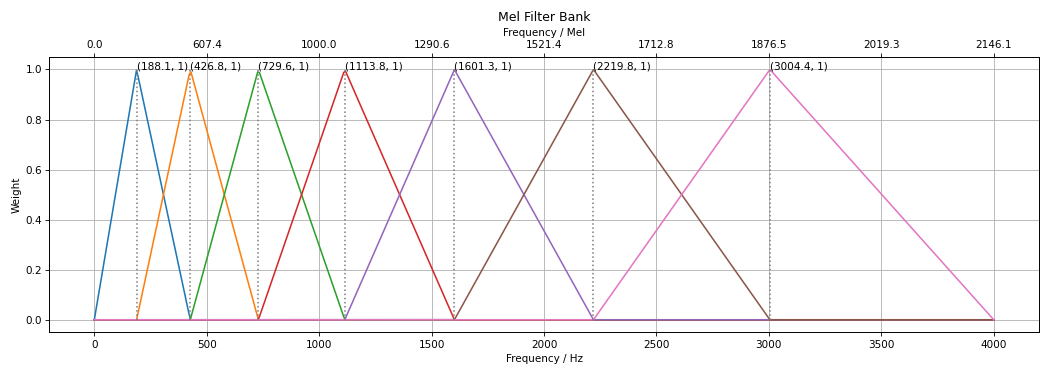
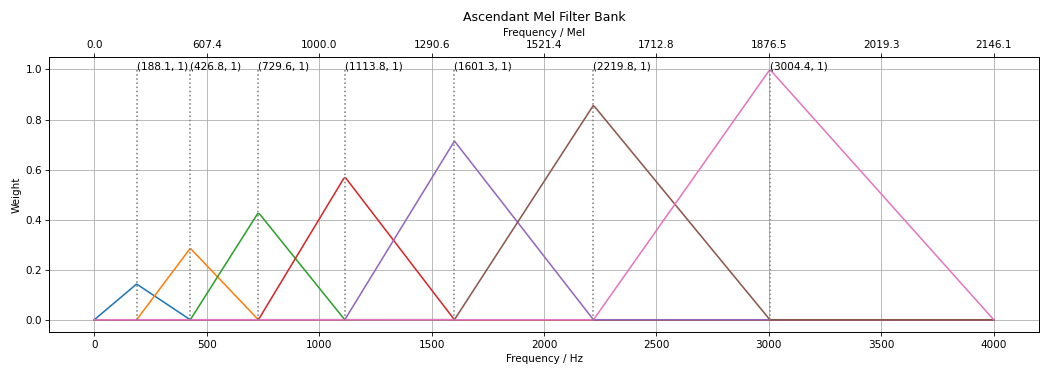
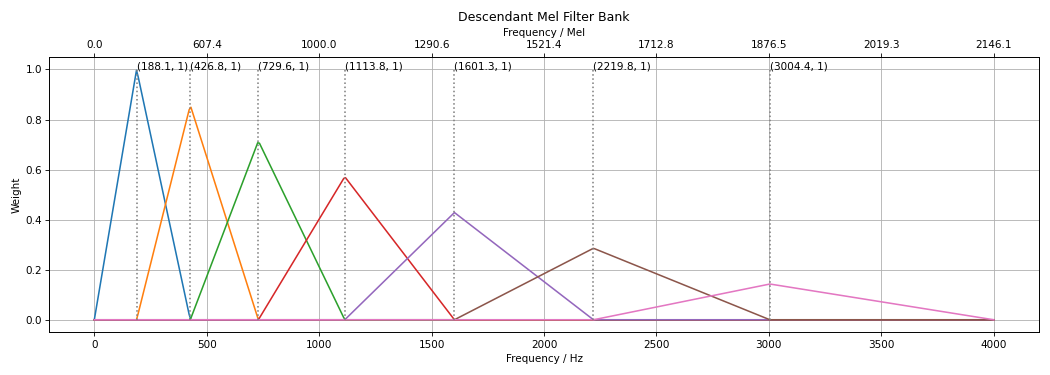
- spafe.fbanks.mel_fbanks.inverse_mel_filter_banks(nfilts: int = 24, nfft: int = 512, fs: int = 16000, low_freq: float = 0, high_freq: Optional[float] = None, scale: typing_extensions.Literal[ascendant, descendant, constant] = 'constant', conversion_approach: typing_extensions.Literal[Oshaghnessy, Lindsay] = 'Oshaghnessy')[source]#
Compute inverse Mel-filter banks. The filters are stored in the rows, the columns correspond to fft bins.
- Parameters
nfilt (int) – the number of filters in the filter bank. (Default 20).
nfft (int) – the FFT size. (Default is 512).
fs (int) – sample rate/ sampling frequency of the signal. (Default 16000 Hz).
low_freq (float) – lowest band edge of mel filters. (Default 0 Hz).
high_freq (float) – highest band edge of mel filters. (Default samplerate/2).
scale (str) – monotonicity behavior of the filter banks. (Default is “constant”).
conversion_approach (str) – mel scale conversion approach. (Default is “Oshaghnessy”).
- Returns
(numpy.ndarray) : array of size nfilts * (nfft/2 + 1) containing filter bank. Each row holds 1 filter.
(numpy.ndarray) : array of center frequencies
- Return type
(tuple)
Tip
scale: can take the following options [“constant”, “ascendant”, “descendant”].conversion_approach: can take the following options [“Oshaghnessy”, “Beranek”, “Lindsay”]. Note that the use of different options than the default can lead to unexpected behavior/issues.
Examples
import numpy as np from spafe.utils.converters import mel2hz from spafe.utils.vis import show_fbanks from spafe.fbanks.mel_fbanks import inverse_mel_filter_banks # init var fs = 8000 nfilt = 7 nfft = 1024 low_freq = 0 high_freq = fs / 2 # compute freqs for xaxis mhz_freqs = np.linspace(low_freq, high_freq, nfft //2+1) for scale, label in [("constant", ""), ("ascendant", "Ascendant "), ("descendant", "Descendant ")]: # compute fbank imel_fbanks_mat, imel_freqs = inverse_mel_filter_banks(nfilts=nfilt, nfft=nfft, fs=fs, low_freq=low_freq, high_freq=high_freq, scale=scale) # visualize fbank show_fbanks( imel_fbanks_mat, [mel2hz(freq) for freq in imel_freqs], mhz_freqs, label + "Inverse Mel Filter Bank", ylabel="Weight", x1label="Frequency / Hz", x2label="Frequency / Mel", figsize=(14, 5), fb_type="mel")
